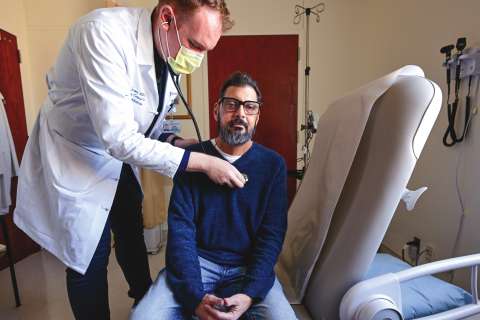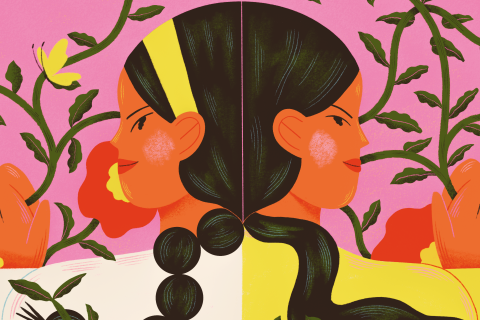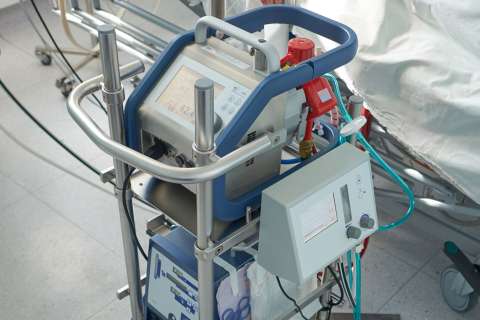UCLA is the first medical center to offer a procedure in which patients who have previously been given a kidney receive an infusion of stem cells from their donor, months or years after the transplant.” Dr. Jeffrey Veale.
Kidney transplantation is considered one of the miracles of modern medicine, enabling recipients to live longer, healthier lives, free from dialysis. But it’s not without a significant downside: In order to prevent the recipient’s immune system from recognizing the new organ as foreign and attacking it, these individuals require powerful immunosuppressant drugs for the life of the transplanted kidney. In addition to side effects and the increased risks associated with a weakened immune system, the toxicity of these medications can ultimately cause the kidney to fail. An ongoing clinical trial at UCLA Health is pursuing what has long been viewed as the Holy Grail by transplant clinicians. UCLA is the first medical center to offer a procedure in which patients who have previously been given a kidney receive an infusion of stem cells from their donor, months or years after the transplant. The approach, which is initially being tested only for transplants within the last five years involving well-matched siblings, aims to achieve “delayed tolerance,” which would allow the kidney recipient freedom from immunosuppressant medications. Jeffrey Veale, MD, director of the UCLA Kidney Transplantation Exchange Program and the surgeon overseeing the clinical trial, discusses this new direction in kidney transplant care.
What is meant by “delayed tolerance?” And how is this procedure designed to achieve it?
In the context of organ transplantation, tolerance means that the body doesn’t react to substances that would usually cause an immune response. Our immune system is set up to react to any foreign proteins and kick them out. A transplanted kidney will trigger that process, which is why transplant recipients need immunosuppression drugs. What we’re doing is infusing blood stem cells from the original organ donor into the bone marrow of the transplant recipient to help them produce the donor’s white blood cells so the immune system recognizes the donor kidney as “self” — something called chimerism. In a sense, from the standpoint of the immune system, this turns the recipient into the donor. We’ve achieved this when done simultaneously with the transplant procedure, but now we are the first to do this months or even years afterward, which is a big stride.
While transplants can extend and dramatically improve lives, you have said that more needs to be done to address the effects of the anti-rejection medications.
That’s right. There was a very good column in The New York Times a couples of years ago in which a heart recipient wrote about the gratitude paradox — where you’re expected to be grateful you got life from the transplant, which makes it hard to complain about these side effects. Immunosuppression medications haven’t significantly changed in 40 years. Our field needs to do better. We have to be more innovative.
What specifically are the downsides to the immunosuppressants?
Many of these drugs are powerful steroids, and no on likes to be on those long term. They can be associated with things like weight gain, acne, fatigue and fluid retention. But more than that, the suppressed immune system makes you susceptible to infections and less able to fight them off. It increases the risk of skin cancer, diabetes and heart disease. And, ironically, the same medications you use so you don’t reject your kidney are also toxic to the kidney. They cause vasoconstriction in the arteries of the kidney transplant, eventually choking it out — typically after 15-to-20 years.
If kidney transplant recipients can reach the point of achieving tolerance and, thus, no longer need immunosuppressant medication, would the transplanted organ be expected to last their lifetime?
Tolerance is such a new field that we don’t have the long-term results to be able to say that definitively, but that is the potential. And if we can achieve that, the benefits go beyond that individual. Due to the shortage of organ donors, there is a waiting list to receive a kidney, and currently 17% of that list consists of people who need a second, third or fourth transplant. If patients no longer are rejecting their transplanted kidney, they won’t be bouncing back to the waiting list, and those who are looking for their first will move up the queue.
Is there reason to be encouraged so far?
We’ve now done this, in delayed fashion, on four patients, two of them nearly five years after the original transplant from their matched sibling. The first two patients are completely off all immune suppression. They had felt much better after their initial transplant, but now, for the first time in many years, they’re off both dialysis and immunosuppression drugs, and it’s another thousand-percent improvement.
If this clinical trial proves successful, could people who had a kidney transplant from someone who wasn’t a sibling also benefit from this approach?
If we show success with well-matched siblings, the next step would be to gradually begin offering it to other well-matched relatives. The better the match, the more likely delayed tolerance will be successful.




